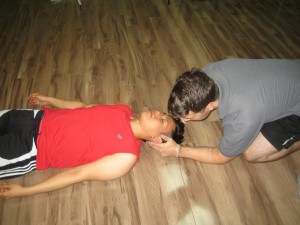Alcohol overdose arises if one ingests too much alcohol. This can occur when drinking too much alcohol at one time. It is important to note that alcohol affects the central nervous system. As a depressant, it slows down movement, speech and reaction time. Many consume alcohol for its relaxing effect. In most cases, drinking is a social activity but consumption of excess amounts regularly can lead to serious health complications.
It is vital to call for emergency assistance right away if an individual experiences alcohol overdose. Remember that this is a serious condition that can be dangerous.
What happens during alcohol overdose?
Alcohol affects all the organs in the body. Overdose can occur if an individual ingests more alcohol than the body can safely process.

Initially, the stomach and small intestine rapidly absorb alcohol so it enters the bloodstream quickly. The more alcohol ingested, the higher the quantity that enters the bloodstream.
The liver also absorbs alcohol, but it can only process a certain amount at a time. The alcohol that the liver could not break down is redirected all over the body. In most cases, the body can safely process 1 ounce of alcohol in an hour. If consuming more than this amount, a large amount is being consumed that the body no longer function properly since the liver could not break it down.
Risk factors
The usual risk factors that increases the chances of alcohol overdose include:
- Gender – men are likely than women to drink heavily
- Age – young adults
- Body size – those with smaller bodies might experience the effects rapidly than those with larger bodies
- Drug use – if drugs and alcohol are combined, the effects of alcohol might not be felt thus more alcohol is consumed
- Tolerance – those with high level of tolerance for alcohol or drinking rapidly are at higher risk for overdose
- Binge drinking (more than 5 drinks in an hour)
- Certain health conditions – certain health issues such as diabetes
What are the indications?
- Pale or bluish skin
- Changes in the mental status such as confusion
- Drop in the body temperature
- Passing out or losing consciousness
Alcohol depresses the nervous system; thus, serious complications might arise if drinking at a rapid rate than what the liver can process.
If an individual is suspected with overdose and loses consciousness, do not leave the individual alone. Position on his/her side in case he/she vomits. Stay with the individual until the emergency team arrives on the scene.
Management
Alcohol overdose is treated in the emergency department. The doctor will monitor the vital signs including the temperature, blood pressure and heart rate.
If serious symptoms develop such as seizures, the doctor might require additional treatment such as:
- Medications or fluids given intravenously
- Supplemental oxygen via a tube inserted into the nose or a mask
- Administration of nutrients such as glucose or thiamine to prevent complications such as brain damage.
More Information / Disclaimer
The information posted on this page on alcohol overdose is for learning purposes only. Learn to recognize and manage this type of overdose by taking a standard first aid course with Toronto First Aid.
